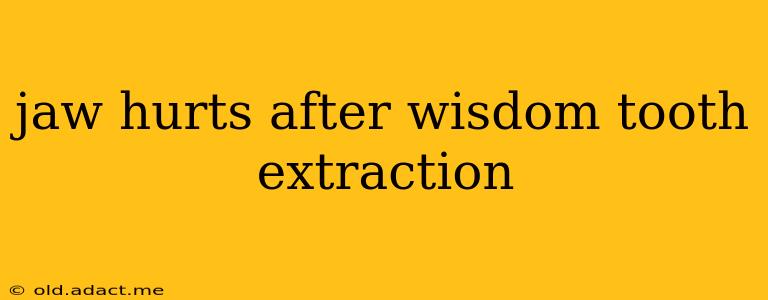Having your wisdom teeth removed is a common procedure, but the recovery process can be uncomfortable. Many patients experience jaw pain after wisdom tooth extraction, and understanding what's normal and when to seek further medical attention is crucial for a smooth recovery. This comprehensive guide will address common concerns and provide helpful advice.
What Causes Jaw Pain After Wisdom Tooth Extraction?
Jaw pain after wisdom tooth extraction is a common side effect stemming from several factors:
- Surgical Trauma: The extraction itself causes trauma to the surrounding tissues, including the jawbone and muscles. This inflammation is a natural part of the healing process.
- Inflammation and Swelling: Significant swelling is expected, and this swelling can put pressure on the jaw, causing pain and stiffness.
- Dry Socket: A painful complication where the blood clot protecting the extraction site dislodges, exposing the bone. This is less common but can be intensely painful and affect the jaw.
- Referred Pain: Pain might radiate from the extraction site to other areas of the jaw, making it difficult to pinpoint the exact source.
- Muscle Strain: Opening your mouth wide during the procedure, or even subconsciously clenching your jaw due to discomfort, can lead to muscle strain and subsequent pain.
How Long Does Jaw Pain After Wisdom Tooth Extraction Last?
The duration of jaw pain varies significantly depending on the complexity of the extraction, individual healing rates, and adherence to post-operative instructions. Generally, you can expect some level of discomfort for the first few days, with the most intense pain subsiding within the first 24-72 hours. Most patients experience a gradual reduction in pain over a week, although some lingering tenderness might persist for several weeks.
What Can I Do to Relieve Jaw Pain After Wisdom Tooth Extraction?
Managing jaw pain after wisdom tooth extraction involves following your dentist's post-operative instructions carefully, as well as employing several self-care measures:
- Ice Packs: Applying ice packs to the affected area for 15-20 minutes at a time, several times a day, can help reduce swelling and pain. Always wrap the ice pack in a thin cloth to protect your skin.
- Over-the-Counter Pain Medications: Your dentist may recommend over-the-counter pain relievers like ibuprofen or acetaminophen. Follow the recommended dosage instructions carefully.
- Rest: Adequate rest is essential for healing. Avoid strenuous activities and get plenty of sleep.
- Soft Foods: Stick to a diet of soft foods like yogurt, applesauce, and mashed potatoes for the first few days to avoid irritating the extraction site.
- Gentle Rinsing: Gently rinse your mouth with warm salt water several times a day to keep the area clean and promote healing. Avoid vigorous rinsing, as this can dislodge the blood clot.
- Elevate Your Head: Sleeping with your head elevated can help reduce swelling and ease discomfort.
When Should I Call My Dentist or Oral Surgeon?
While some jaw pain is expected, it's crucial to contact your dentist or oral surgeon immediately if you experience:
- Severe or worsening pain: Pain that doesn't respond to over-the-counter medication or that gets progressively worse should be reported.
- Excessive bleeding: Continuous bleeding or bleeding that soaks through multiple gauze pads should be addressed promptly.
- Signs of infection: Fever, increased swelling, pus, or redness around the extraction site are signs of potential infection and require immediate medical attention.
- Difficulty swallowing or breathing: These symptoms require immediate medical attention.
- Numbness that lasts longer than expected: While some numbness is normal, prolonged or worsening numbness warrants a call to your dentist.
How Can I Prevent Jaw Pain After Wisdom Tooth Extraction?
While you can't completely eliminate the possibility of jaw pain, you can take steps to minimize it:
- Follow your dentist's instructions carefully: Adhering to post-operative instructions is crucial for a smooth recovery.
- Maintain good oral hygiene: Brush and floss gently around the extraction site after the initial healing period.
- Eat a healthy diet: A healthy diet supports overall healing and reduces the risk of complications.
This information is for general knowledge and does not constitute medical advice. Always consult your dentist or oral surgeon for personalized guidance and treatment regarding your specific situation. They can assess your individual needs and provide the best course of action to ensure a successful recovery.
